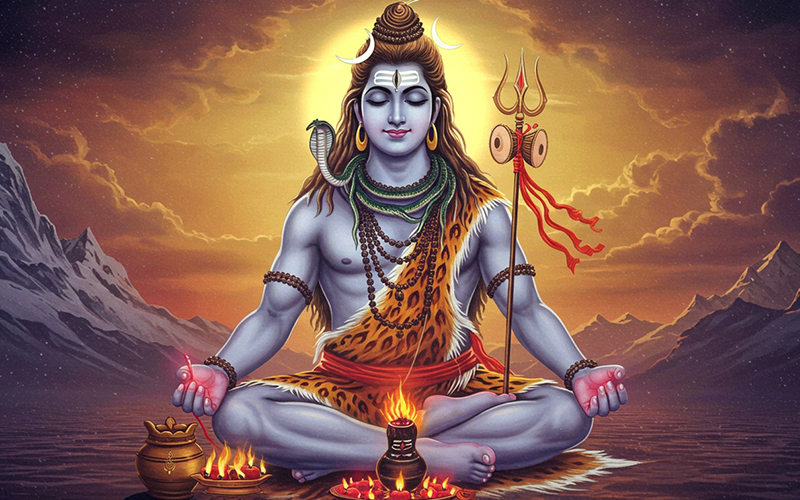A warm welcome back to our sacred space on the “Vibes of Divinity” blog! As we continue to journey together through the transformative world of mantras—a path that complements the rich Puranic storytelling you find on our YouTube channel—we arrive at a mantra of profound significance for healing, protection, and liberation: the Mahamrityunjaya Mantra.
This ancient and potent chant, also known as the Tryambakam Mantra, is a prayer to Lord Shiva in His aspect as Mrityunjaya, the conqueror of death (Mrityu). It is revered for its power to overcome fear, illness, and negativity, bestowing health, longevity, and spiritual awakening.
The Mantra Itself:
- Devanagari Script: ॐ त्र्यम्बकं यजामहे सुगन्धिं पुष्टिवर्धनम् । उर्वारुकमिव बन्धनान् मृत्योर्मुक्षीय मामृतात् ॥
- IAST Transliteration: Oṃ Tryambakaṃ Yajamahe Sugandhiṃ Puṣṭivardhanam Urvārukamiva Bandhanān Mṛtyormukṣīya Māmṛtāt
- Simplified Phonetic Pronunciation: Om Try-um-ba-kum Ya-jaa-ma-hay Su-gan-dhim Push-ti-var-dha-num Oor-vaa-roo-ka-mi-va Ban-dha-naan Mrityor-muk-shee-ya Maa-mri-taat
Unveiling the Profound Meaning:
Let’s explore the deep significance embedded in each part of this mantra:
- ॐ (Om): The primordial sound, representing the Absolute Reality.
- त्र्यम्बकं (Tryambakaṃ): “The Three-Eyed One.” This refers to Lord Shiva, whose third eye represents the eye of wisdom, intuition, and the power to perceive beyond the ordinary. It also signifies His lordship over the past, present, and future, or the three Gunas (Sattva, Rajas, Tamas).
- यजामहे (Yajamahe): “We worship,” “we sacrifice to,” “we revere,” “we adore.”
- सुगन्धिं (Sugandhiṃ): “The fragrant one,” “the sweet-smelling.” This refers to the sweet fragrance of spiritual virtue, purity, and the blissful essence of Lord Shiva that permeates all existence.
- पुष्टिवर्धनम् (Puṣṭivardhanam):
- Puṣṭi: Nourishment, abundance, well-being, strength, fullness of life.
- Vardhanam: One who increases, nourishes, strengthens, or causes to prosper.
- “He who nourishes and strengthens all beings, increasing their vitality.”
- उर्वारुकमिव बन्धनान् (Urvārukamiva Bandhanān):
- Urvārukam: A type of cucumber or melon.
- Iva: Like, as.
- Bandhanān: From bondage, from the stem/stalk.
- “Just as the ripened cucumber is effortlessly severed from its bondage to the vine…” (This imagery signifies a natural, non-forceful liberation).
- मृत्योर्मुक्षीय (Mṛtyormukṣīya):
- Mṛtyoḥ: From death (both physical death and the cycle of death and rebirth, or spiritual death/ignorance).
- Mukṣīya: May I be liberated, freed.
- “…so may I be liberated from death.”
- मा अमृतात् (Mā Amṛtāt):
- Mā: Not.
- Amṛtāt: From immortality (or the nectar of immortality).
- “…not from immortality.” This crucial phrase means “Liberate me from death for the sake of immortality.” It is a prayer for liberation into the immortal state, not a denial of it.
The Overall Invocation:
“Om. We worship the Three-Eyed Lord (Shiva) who is fragrant and who nourishes all beings. Just as the ripened cucumber is severed from its bondage to the creeper, may He liberate us from death for the sake of immortality.”
The Power and Grace of Mrityunjaya:
This mantra is a powerful appeal for:
- Health and Healing: Believed to cure ailments and promote physical well-being.
- Longevity: For a long and healthy life.
- Protection: From accidents, calamities, and negative forces.
- Fearlessness: Overcoming the fear of death and all other fears.
- Spiritual Liberation (Moksha): Freeing oneself from the cycle of birth and death and the bondage of ignorance.
- Inner Peace and Well-being: Calming the mind and fostering a deep sense of security.
Scriptural Roots and Significance:
The Mahamrityunjaya Mantra is found in the Rigveda (Mandala 7, Hymn 59, Verse 12) and is attributed to the sage Markandeya. Legend has it that Sage Markandeya, destined to die young, was saved from Lord Yama (the god of death) by Lord Shiva Himself when the sage fervently chanted this mantra. This story, often recounted in the Puranas (which we love to bring to life on our “Vibes of Divinity” YouTube channel!), underscores the mantra’s life-saving and protective power.
When and How to Chant:
- For Healing: Can be chanted for oneself or for others who are unwell.
- For Protection: Before journeys, or during times of fear or uncertainty.
- Daily Practice: An excellent addition to daily spiritual practices for overall well-being.
- Birthdays: Often chanted on birthdays as a prayer for longevity and a healthy year ahead.
- Specific Times: Early morning (Brahma Muhurta) is considered highly auspicious.
- Repetitions: Traditionally chanted 108 times using a Japa Mala. It can also be chanted in smaller multiples like 3, 9, 11, or 27 times with devotion.
- With Sincerity: Chant with deep faith, reverence, and a clear understanding of its meaning. Visualizing Lord Shiva’s healing and protective energy can enhance its efficacy.
An Invitation to Immortality and Well-being:
The Mahamrityunjaya Mantra is a beacon of hope, a powerful spiritual tool for navigating the challenges of life and death. It connects us to the eternal, life-giving essence of the Divine, offering solace, strength, and the promise of ultimate liberation.
We invite you to experience the profound vibrations of this mantra. Let its healing energy permeate your being.
Have you experienced the power of the Mahamrityunjaya Mantra? We would be honored if you shared your insights or experiences in the comments below.
As we continue to explore these sacred chants, remember that the stories behind many of these deities and their boons are waiting for you on our YouTube channel, “Vibes of Divinity.” Join us as we uncover the layers of wisdom our tradition offers!
May this mantra bring healing, peace, and fearlessness into your life.
